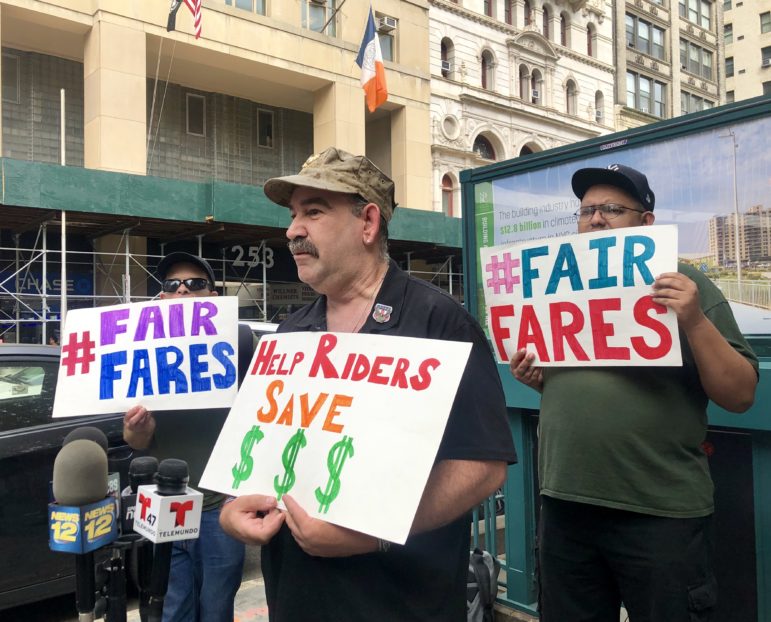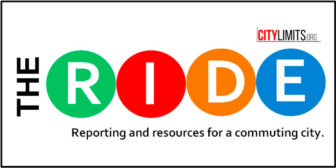
Jeanmarie Evelly
Allan Singer, center, speaks at a Riders Alliance press conference. He says he struggles to afford his transit fare but doesn’t currently qualify for Fair Fares because he doesn’t meet its employment requirement.
Since its launch at the start of the year, more than 76,000 people have enrolled in the city’s Fair Fares program, which offers half-priced MetroCards to certain residents living at or below the federal poverty line—an effort to alleviate some of the burden low-income New Yorkers face in accessing public transit.
And as the city gets ready to expand the program’s eligibility requirements this fall and winter, advocates and residents continue to push for it to cover more people, saying access to affordable transit provides myriad benefits and would help reduce fare evasion in the transit system, something MTA leaders have been cracking down on in recent months. In June, Gov. Andrew Cuomo announced he’d struck an agreement with the city to hire 500 new police officers to patrol the city’s subways and buses, in part to deter those who skip the fare.
“All this money being put toward the fare evasion campaign could just as easily be put toward this,” says Mike Gonzalez, an Astoria resident who’s been participating in Fair Fares for the last eight or nine months and says his half-priced MetroCard has been “tremendously helpful” to making ends meet.
“I’m really grateful to this program, I’m grateful that this pilot program has been put into effect, but I would like to see it reach more people,” he added. “I think all New Yorkers, low-income or not, deserve a right and access to public transportation.”
On Wednesday’s Max & Murphy Show on WBAI, David Jones, the CEO and president of the Community Service Society, a nonprofit whose research launched the Fair Fares campaign, linked the slow rollout of the program to the de Blasio administration’s initial resistance to the idea and seeming disinterest in getting credit for having embraced it. (CSS is a funder of City Limits.)
“We had to really struggle with him. He didn’t necessarily support me and us and Riders Alliance on this originally. I think it did really come about because of the City Council and Corey Johnson,” Jones said. “Clearly [the mayor] didn’t talk about it on the campaign trail. I was very surprised. We’re the largest experiment of this sort anywhere in the countryand potentially anywhere in the world. And yet, because of the struggle I guess, he didn’t want to talk about it. But it’s a big deal for people at the bottom end of the economic scale.”
To currently be eligible for the discounted cards, participants must reside within the five boroughs and meet the program’s income requirements, and are also required to be employed and receiving SNAP and/or Cash Assistance benefits from the city. Those who are eligible are contacted via letter and can then enroll in Fair Fares through the city’s Human Resources Administration (HRA).
Sometime this fall, the program will expand to include NYCHA residents, CUNY students and students who are also veterans, though city officials did not provide an exact date for when that will happen. Come January, all New Yorkers who live at or below the poverty level will be able to apply, according to the city.
More than 150,000 residents meet the requirements for the current eligibility criteria, officials say. Of those, 76,021 have enrolled so far, and the city has been conducting outreach in the form of phone calls and letters.
“More than 76,000 New Yorkers have enrolled in Fair Fares, both in person and online through our Access HRA app, which makes the process even easier by enabling eligible individuals to sign up anytime, anywhere,” Isaac McGinn, spokesman for the Department of Social Services said in a statement. “Through sustained outreach efforts, we are continuing to bring this game-changing resource to even more New Yorkers who need it.”
But some remain frustrated at the phased-in rollout of the program. They include Allan Singer, a low-income veteran from the Bronx who says he often struggles to afford the cost of his transit rides.
“I have to choose between a MetroCard and a meal to get to my appointments,” he says, saying that while he receives public benefits, he’s unemployed, so doesn’t meet the program’s existing criteria that requires participants to be currently working. The expansion this fall will extend the discounted cards only to veterans who are also students, not to veterans more generally.
“I can’t get around now and get to my appointments, and get to job interviews,” Singer says. “At the moment I don’t qualify, and I feel that I can’t wait until January.”
In anticipation of the program’s expansion, transit advocacy group Riders Alliance—which helped wage a two-year campaign to secure the current funding for Fair Fares, and of which Singer is a member—is surveying participants to get feedback on what’s working so far, and what could be improved.
The group is asking current Fair Fares participants to fill out their online questionnaire, which asks about how the discounts have impacted them and if there’s any changes they’d like to see.
“We’re 10 months into the program, into the first phases of the program. Before we hit that year mark, and before we have the full expansion, we want to make sure that low-income New Yorkers have a voice directly to City Hall,” says Rebecca Bailin, political director for Riders Alliance. “If New Yorkers who are impacted by the program don’t have a voice, this program will not be successful.”










One thought on “City’s Half-Priced MetroCard Program Continues to Expand, But Frustrations Persist”
Pingback: October 4, 2019 - Weekly News Roundup - New York, Manhattan, and Roosevelt Island | Manhattan Community Board 8